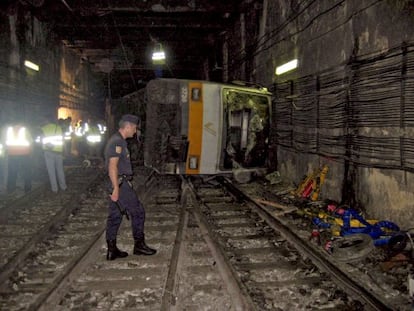Public prosecutor asks for Valencia Metro crash inquiry to be reopened
New evidence emerges over train derailing accident that killed 43 people in 2006

The investigation into the 2006 Valencia Metro accident, in which 43 people were killed and 47 injured, is likely to be reopened. The regional public prosecutor’s office on Monday presented a submission in which it requested that the case, which was shelved in 2007, be reexamined in the light of “new evidence and data, and other information that at the time was not considered relevant, which could have affected the state of repair of the train.”
According to a release from the prosecutor’s office, the matters that it wishes to be reinvestigated could constitute 43 counts of negligent homicide and 47 of causing injury through professional negligence. However, the original court ruling in 2007 stated that it considered any penal responsibility void after the death of the driver, Joaquín Pardo, at the scene. The case was definitively shelved in December of the same year with the court ruling that the cause of the accident was the excessive speed of the train when it rounded a curve in a tunnel between the Plaça d’Espanya and Jesús stations on Line 1 of the Metrovalencia transit system.
Families of the victims have for years been asking for the case to be reopened. The Valencia Socialist Party and the Cercle Obert victims association filed new suits with the prosecutor’s office in the light of testimony recorded in a television program that aired in April this year and documentaries made by Barret Films that were released by the victims association. Among the questions raised is whether employees of Ferrocarrils de la Generalitat Valenciana (FGV), which manages the metro, received coaching before giving testimony during a brief investigation commission held in the regional assembly.
In recent months new evidence about the operational state of the train has also emerged. FGV sent the rail constructor Vossloh a report a year before the crash stating that the UTA 3700 series was at the “end of its useful life” and was causing “serious maintenance problems.”
Among the issues is whether workers gave false testimony in the commission
“We consider it necessary to renew these trains,” concluded the report, which was not submitted during the 2006 investigation but was brought to light later by a regional deputy for the Compromís platform, Mónica Ultra. Previous derailings suffered by unit 3736, which formed part of the fated UTA 3700, in 1992, 1996 and 2002 were also not reported.
“At last there will be an in-depth judicial investigation,” said Beatriz Garrote, president of the July 3 Victims Association, who believes that in the original case FGV “refused the possibility of valuable evidence being analyzed; they hid it.”
The decision on whether or not to reopen the investigation lies with the courts and the prosecutor’s request was greeted with satisfaction and “caution” by victims associations. However, calls by the opposition to the governing Popular Party in Valencia for another commission to be held were rebuffed by the regional premier, Alberto Fabra.
“Why would we reopen the commission if what was shelved was the accusation of false testimony and the only thing that [the prosecutor] has said is that other documents need to be taken into consideration?” Fabra said Tuesday, adding that his administration was willing to “cooperate with the courts” and provide the necessary information.
Tu suscripción se está usando en otro dispositivo
¿Quieres añadir otro usuario a tu suscripción?
Si continúas leyendo en este dispositivo, no se podrá leer en el otro.
FlechaTu suscripción se está usando en otro dispositivo y solo puedes acceder a EL PAÍS desde un dispositivo a la vez.
Si quieres compartir tu cuenta, cambia tu suscripción a la modalidad Premium, así podrás añadir otro usuario. Cada uno accederá con su propia cuenta de email, lo que os permitirá personalizar vuestra experiencia en EL PAÍS.
¿Tienes una suscripción de empresa? Accede aquí para contratar más cuentas.
En el caso de no saber quién está usando tu cuenta, te recomendamos cambiar tu contraseña aquí.
Si decides continuar compartiendo tu cuenta, este mensaje se mostrará en tu dispositivo y en el de la otra persona que está usando tu cuenta de forma indefinida, afectando a tu experiencia de lectura. Puedes consultar aquí los términos y condiciones de la suscripción digital.








































